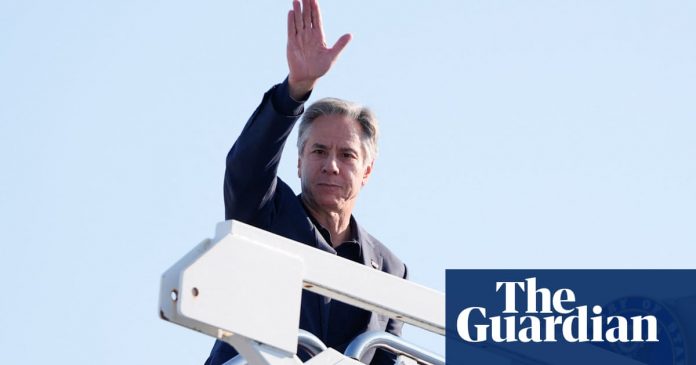Moscow’s use of a shadow fleet transporting western-sanctioned oil, Ukraine’s call to fire to fire UK-supplied missiles into Russia and the value of publishing a new version of the US ceasefire plan for Gaza, will top US-UK talks in London being attended by Antony Blinken, the US secretary of state.His meeting this week with the British foreign secretary, David Lammy, will make him the most senior US official to visit the UK since Labour’s general election victory in July. It is also a precursor to talks in Washington between Joe Biden and Keir Starmer at the end of the week.The two leaders are billed to make a hard-headed assessment of the state of the war, as Ukraine loses ground on the eastern frontline. Starmer in particular is keen to see off muffled Ukrainian criticism that he is not taking as strong a line as the previous Conservative government.In July, the prime minister led a “call to action” to strengthen international cooperation to crack down on Russia’s use of covert oil tankers. Signed by 39 countries at a meeting of the European Political Community (EPC) in Blenheim, Oxfordshire, it called for greater action by flag operators, ports and the maritime industry to shut down the shadow fleet, but since then the number of tankers trying to evade a western effort to impose a $60-a-barrel price cap on Russian oil sales has hardly changed.Moscow has turned to older riskier carriers to transport oil, related products and liquefied natural gasthat operate outside western insurance. The Kremlin move has also led to dangerous ship-to-ship oil transfers including off the eastern coast of Gotland, Sweden, just outside the 12-nautical-mile limit that denotes a country’s territorial waters.The $60 cap is designed to keep Russian oil revenues down, but not drive up the global price of oil. A Kyiv School of Economics (KSE) study published after the EPC summit said Russian oil export revenues were $17.1bn in July because of higher crude and oil product prices, and weak enforcement of the price cap.KSE found the west was still not sanctioning the core ships in the Russian shadow fleet. From January 2023 to June 2024, it said 307 shadow tankers carried Russian crude oil at least once, but only a subset, identified in the study as 45 tankers, operated consistently across all six quarters.It said that of this “core” shadow fleet only seven vessels have been sanctioned by the US, EU or UK.The UK is also looking to see what more can be done to name and shame small poor countries from developing ship registers that allow such vessels to fly under their flag. The landlocked African state of Eswatini, formerly Swaziland, has agreed to dismantle its recent ship registers. It was declared a false operation by the International Maritime Organization earlier this year.Blinken and Lammy are also likely to discuss Kyiv request for Ukraine to be allowed to fire UK-supplied Storm Shadow missiles into Russia if necessary. The former UK defence secretary Grant Shapps at the weekend called for the west to shed its reluctance over Ukraine using such weaponry directly at Russia.“We know that many attacks are launched from Russia itself. And yet, with the exception of our giving permission to allow UK missiles to strike Crimea, we have remained cautious about allowing our Ukrainian allies to target the source of these attacks,” he said.Shpps claimed the lack of authorisation for Ukraine to use Storm Shadows “where they would be most effective” undermined London’s credibility as an ally of Kyiv.His remarks suggested there was a block on the use of the missiles even though Starmer said in July it was up to Ukraine with regards how it decided to use the weapons.Lammy and Blinken are also expected to discuss whether any security guarantees could be provided to Benjamin Netanyagu, to allay what the Israeli prime minister has said are his fears over withdrawing from the Philadelphi corridor running along the Gaza-Egypt border. Cairo is insisting the Israel Defense Forces withdraw at the first stage of a ceasefire deal with Hamas. Netanyahu says Israeli forces must remain in the corridor to ensure further weapons are not smuggled into Gaza from Egypt for use by Hamas.

